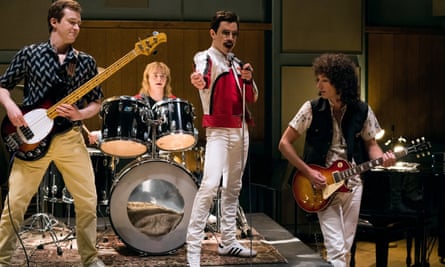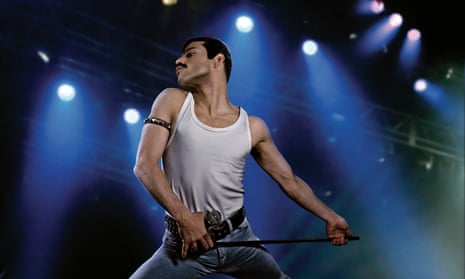‘We don’t follow formulas,” say the members of Queen, circa 1975, but anyone hoping for this Freddie Mercury biopic to take its cue from the rock-operatic masterpiece of the title will be disappointed. Rami Malek’s excellent performance aside, it feels less a pioneering musical odyssey than a really good covers band. Then again, considering the many, well-publicised troubles this movie has been through over the years – Malek stepped in to replace the departed Sacha Baron Cohen, director Dexter Fletcher stepped in to replace the departed Bryan Singer – it is some achievement that it finally got made at all. Maybe the formula was simply “get the damn thing finished”.
There is no lack of material to work with, given Queen’s stratospheric rise and Mercury’s tragic fall – he died from Aids-related illness in 1991. Not to mention the on-the-face of it improbability of a straight, white rock band fronted by a flamboyant, gay man of Asian descent. Perhaps as a result of the personnel changes, Bohemian Rhapsody struggles to find a fresh way to tell its story. It begins with Zanzibari immigrant Farrokh Bulsara forsaking his traditional family and racist 1970s smalltown for the glamour of rock’n’roll, then skirts dangerously close to Spinal Tap territory, what with microphone-stand malfunctions and old-school industry execs telling our be-mulleted quartet what to do.
But even at this stage it feels like the story is being told with the benefit of hindsight. Malek’s Mercury seems to arrive fully formed and entirely confident that everything will work out, and some of the dialogue is just too on the nose to ring true (“there’s no musical ghetto that can contain us”; “I won’t compromise my vision any longer”). All of which almost cheats us of the anticipated first-act rush of success. Lady Gaga’s A Star Is Born managed to communicate it exhilaratingly; here it’s practically a fait accompli.
Malek’s transformation is initially disconcerting, it must be said. His plummy accent feels exaggerated, as does his approximation of Mercury’s famous overbite, achieved with dental prosthetics that make him look like a Simpsons character come to life. But as he loses the mullet, grows the moustache and heads into the late 1970s, he really grows into the role. The singing voice is apparently an “amalgamation”, not Malek’s own, but on stage he apes Mercury’s strutting, virile bravado with dynamic conviction, particularly in the climactic recreation of Queen’s legendary Live Aid performance. It’s a feat of impersonation.

The real problem is how to handle Mercury’s off-stage life. On the one hand, there is the story of Mercury’s relationship with Mary Austin, played by Lucy Boynton. They begin as lovers and even become engaged, although it is as clear to her as it is to us that Mercury is bisexual, if not gay. The film’s most moving scene is where Mercury admits to this, and to his complex feelings of love for Mary. “I want you in my life,” he tells her. “Why?” she replies.
But on the other hand, there’s also Mercury’s bromance with the other members of Queen to address. Two of them, Brian May and Roger Taylor, co-produced the movie, after all (plus the band’s manager, Jim Beach). Sacha Baron Cohen allegedly walked from the movie when May outlined a story to him where Mercury’s death comes halfway through, “and the band goes from strength to strength”. May denied that was the case, and if ever it was, they thankfully changed tack. The band members take a back seat, but not too far back so as to leave the impression Mercury was the sole talent. You still discover, for example, that May wrote We Will Rock You, that Taylor was a hit with the ladies, and that John Deacon wrote Another One Bites the Dust.
By the early 1980s, crisis looms: the married Queen members no longer share Mercury’s tastes in fashion, partying, sexual partners, or even music. The inevitable bust-up is another page out of the Spinal Tap playbook but, unforgivably, Bohemian Rhapsody casts Mercury’s wilderness years as a symptom of his gayness. We see the solo Mercury in Munich, drug-addled, shorn of his real friends and exploited by his new ones, who are mostly leather-clad, party-happy men. It reduces Mercury’s homosexuality to a tutting “he’s got in with the wrong crowd”.
A few weeks ago, I wrote that my benchmark for a Mercury biopic would be a re-creation of Queen’s legendary 1977 launch party in New Orleans, featuring naked waiters, contortionists, drag queens and dwarves with platters of cocaine on their heads. This being a 12A/PG13 certificate, no such rock excess is on offer, leaving only a few kisses and gropes and the odd reference to being “high” to suggest Mercury’s wild party lifestyle. That and the moralistic sneering.

A bolder film might have explored the relationship between Mercury’s hedonism, his mostly closeted sexuality and his on and off-stage personas in a more nuanced way. Or at least taken its cue from Mercury’s own songbook and played it with some melodramatic abandon. This is a man who responded to his Aids diagnosis with songs like Who Wants To Live Forever? and The Show Must Go On, after all. As it is, this one seeks to tick the biographical boxes and wrap everything up neatly with a redemptive finale. That comes via the Live Aid performance, which could be either seen as an impressive technical feat or an extended karaoke session, but at least ends the story on a high. Bohemian Rhapsody honours Mercury the showman but never really gets to Mercury the person.

Comments (…)
Sign in or create your Guardian account to join the discussion